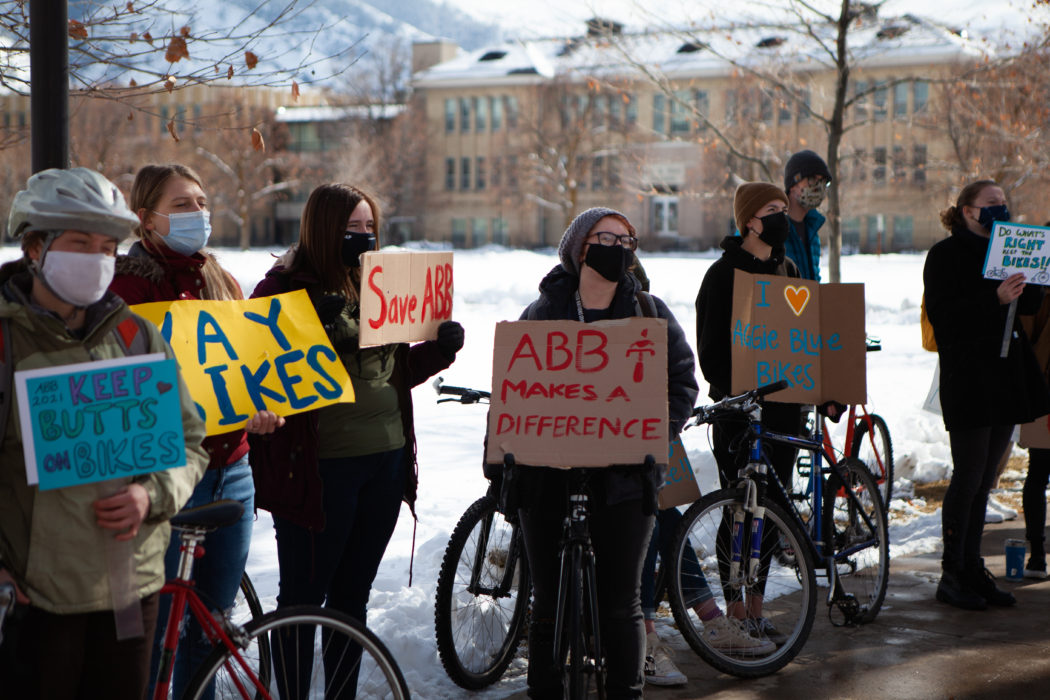Students protest Aggie Blue Bikes funding decrease — and the administration listens
On Thursday, Utah State University students gathered on the quad to protest a proposed funding decrease for Aggie Blue Bikes.
The protest was planned three hours ahead of a student fee board presentation recommending a $10,000 annual revenue reduction for the program.
Students biked around the quad, made speeches on the “A” and signed a banner that would be brought to the student fee board meeting later that day. Many students brought painted signs with messages in support of the program such as, “save a horse, ride a bike” and “mobility is essential.”
Originally formed to combat Cache Valley’s poor air quality, Aggie Blue Bikes is a program with the goal of getting more people on bikes. Aggie Blue Bikes offers free bike rentals and one-on-one tutorials on bike maintenance to USU students, funded by a student fee of $2.78 each semester.
When the protest was planned, students were still under the impression that the program would lose all funding from student fees. By the time they gathered at the quad, a compromise had been proposed for $1.11 per student, but students were still advocating for no funding decrease at all, ringing their bike bells and chanting “keep two seventy eight.”
Carter Moore, a former mechanic at Aggie Blue Bikes, organized Thursday’s protest. He said the main reason to fight for the program is it provides essential services.
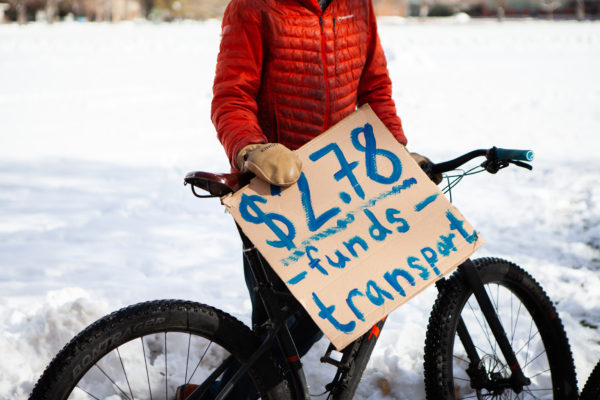
“It gets the most vulnerable and the lowest income and the international students moving around the community, able to get to jobs, get groceries and that sort of thing for $2.78,” Moore said.
Moore planned the protest just the night before. He said when he first learned about the program losing funding, he created some graphics explaining the issue but later decided it would be necessary to have an in-person demonstration.
“Our whole purpose with this is just to kind of show that there is support among the campus community, and passionate support at that, not against Noelle, but for Blue Bikes,” Moore said. “But it does piss me off that this university wants to do the virtue-signaling that we’re going for carbon neutrality, wants to pretend that they care about their international and low-income students, and then cuts one of the services that directly benefits those students.”
University President Noelle Cockett and USUSA President Sami Ahmed’s original reasoning for cutting the program was that it competed with local businesses. Moore called this reasoning a “pure fallacy.”
Multiple students protesting said working as a mechanic at Aggie Blue Bikes actually helped them later get jobs at local bike shops. One protester pointed out other USU amenities like dining services and the Aggie Recreation Center also potentially compete with local businesses but aren’t at risk of losing their funding.
Another main protesting point was that USU was designated as a gold-level Bicycle Friendly University Thursday morning by the League of American Bicyclists, but the school risked losing the designation if anything happened to Aggie Blue Bikes.
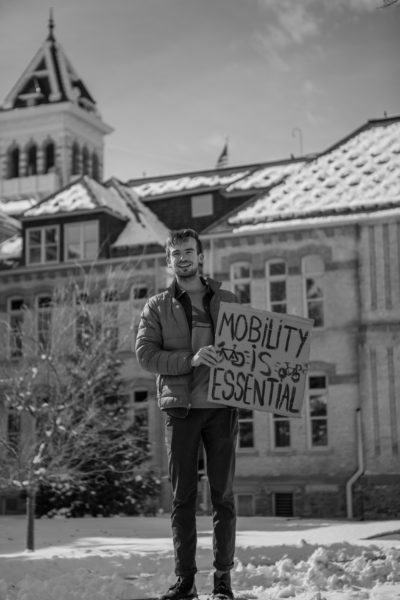
At the student fee board meeting Thursday afternoon, Cockett and Ahmed explained why funding for some programs had to decrease. The board of trustees told them to hold student fees flat indefinitely only two days after the student fee board already recommended a net increase in student fees of $4.90.
In the recommendation proposed at the student fee board meeting, Aggie Blue Bikes will lose $1.67 per student, and the remaining $1.11 will actually transition to being part of student tuition. With this recommendation, the program would lose about $60,000 in annual revenue.
“The intent with this is not to harm students, or to make sure that some resources are gone,” Ahmed said. “It’s just with the constraints that we face, what is the best thing that we can do?”
In response to the student support for Aggie Blue Bikes, Cockett and Ahmed proposed that parking permits would begin to include a $10 surcharge that would go towards funding Aggie Blue Bikes. This would make up for $50,000 of the $60,000 the program would lose from student fees, leaving $10,000 for the program to find alternative funding for.
Cockett believes that rather than charging every student for Aggie Blue Bikes, putting the funding on parking passes sends a good message about sustainability.
“We keep Aggie Blue Bikes going, and we make people a little more conscious about driving and parking on campus,” Cockett said.
Cockett ended Thursday’s student fee board meeting by thanking the board for helping her realize how important the Aggie Blue Bikes program is to students.
Maria Catalano, the natural resources senator and the senator over the Aggie Blue Bikes fee, was present at Thursday’s protest and was the one to display the signed banner during the student fee board meeting.
Before the student fee board meeting, Catalano was frustrated that senators were taken out of the fee decision. After the meeting, she still felt like her position had been undermined, but she said that she believes if another cut like this happens in the future, Cockett will learn from this experience and talk to students first.
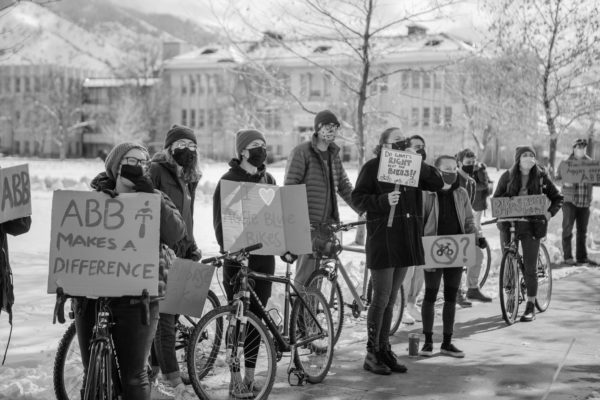
“They just decided the parking thing today after all the feedback, and so I really appreciate them listening to students,” Catalano said. “I think it’s a good idea for right now to cover most of the funding that the program is losing.”
As the surcharge on parking passes discourages driving on campus, Catalano said she is concerned that Aggie Blue Bikes will eventually need to increase funding again. However, she left the meeting feeling content that progress is being made.
“I think this is a good first step in recovering the program,” Catalano said. “Yesterday it was just a complete cut, and today they’ve found a way to get $50,000 of it back from another source.”
Meg McCarthy, the program coordinator for Aggie Blue Bikes, said a $10,000 decrease in funding shouldn’t impact the program too much.
“Now that we’re not student fee-funded, I think that’ll give us the opportunity to charge more often or expand our services more into the community,” McCarthy said. “So we might be able to generate more revenue.”
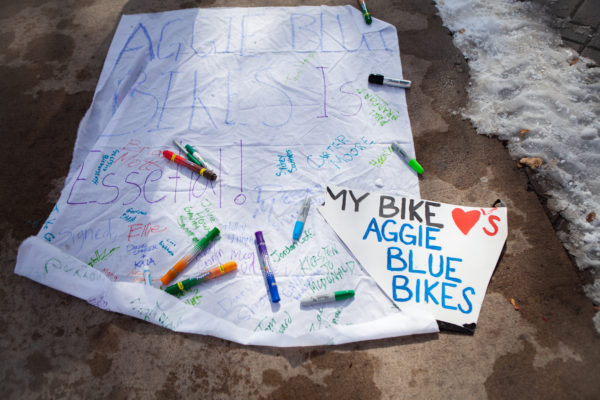
Though it was a “whirlwind of a week” for Aggie Blue Bikes, McCarthy said that it was a positive experience to see all of the support for the program and hear about all the ways it has changed students’ lives.
“I’m super thankful that so many people spoke out and got in touch with the president’s office, and I’m really glad they found a way to alternatively fund our program,” McCarthy said. “It actually feels even more secure.”
*Photos by Lizzy Driggs.
 Darcy Ritchie is a second-year journalism student at Utah State from Idaho Falls, Idaho. Outside of writing for the Statesman, she loves to DJ for Aggie Radio, eat french bread in the Walmart parking lot, and tweet.
Darcy Ritchie is a second-year journalism student at Utah State from Idaho Falls, Idaho. Outside of writing for the Statesman, she loves to DJ for Aggie Radio, eat french bread in the Walmart parking lot, and tweet.
—darcy.ritchie@usu.edu
@darcyrrose

